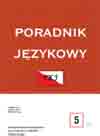Dekompozycja słowa jako środek ekspresji poetyckiej
Word decomposition as a device of poetic expression
Author(s): Anna PajdzińskaSubject(s): Language and Literature Studies
Published by: Dom Wydawniczy ELIPSA
Summary/Abstract: This paper regards one of the manifestations of a creative approach to lexical items in the contemporary Polish poetry – word decomposition. The analysis of ten-odd examples from the works by Julian Tuwim, Jacek Karczmarski, Miron Białoszewski and Robert Tekieli proves that decomposition assumes various forms: segmenting a word into meaningful or asemantic particles – with the division signalised graphically (with a hyphen or a special line notation) or not; reducing a word by certain components; subjecting a part of a word to additional operations. Word decompositions – earlier nearly exclusively humorous or satirical – in the 20th-century Polish poetry were strongly semanticised and functionally subordinate to specifi c works and at the same time fulfi lled more general functions: they characterised the processes occurring in the depicted world and became an exponent of reflection on the relation between language and extralinguistic reality. Particularly in the works by Robert Tekieli, in combination with the applied line structure, they express the situation of uncertainly of the contemporary human being and the sense of extreme relativism of meanings and values.
Journal: Poradnik Językowy
- Issue Year: 2013
- Issue No: 05
- Page Range: 5-17
- Page Count: 13
- Language: Polish
- Content File-PDF

